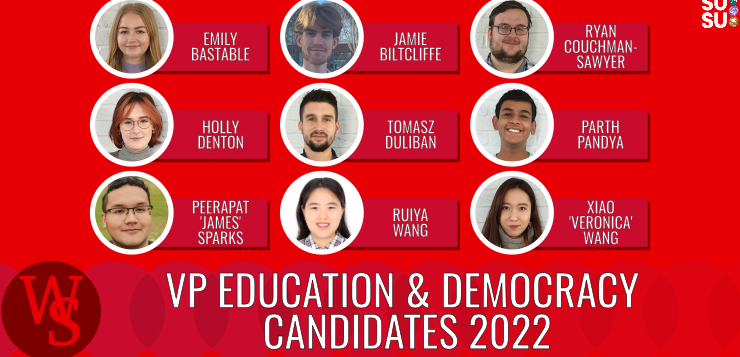- Interview with Zoe Chapple: VP Activities Candidate
- Interview with Rishi-Nayan Varodaria: Union President Candidate
- Interview with Parth Pandya: VP Education and Democracy Candidate
- Interview with Samuel Pegg: VP Activities Candidate
- Interview with Oliver Murray: Union President Candidate
- Interview with Xiao ‘Veronica’ Wang: VP Education and Democracy Candidate
- Interview with Benedict Madan: Union President Candidate
- RUMOUR HAS IT… 2022 UNION ELECTIONS RUMOURED SABBATICAL OFFICER CANDIDATES
- Interview with Jamie Biltcliffe: VP Education and Democracy Candidate
- Interview with Holly Denton: VP Education and Democracy Candidate
- Interview with Emily Bastable: VP Education and Democracy Candidate
- Spring Elections 2022 Candidates Revealed
- There’s still time to nominate yourself for a SUSU leadership role
- Interview with Harry Bull: Union President Candidate
- Interview with Ryan Couchman-Sawyer: VP Education and Democracy Candidate
- Interview with Selin Moustafa: VP Welfare and Community Candidate
- Interview with Ruby Turner: VP Welfare and Community Candidate
- Interview with Aycha Ates-Di Adamo: VP Welfare and Community Candidate
- Interview with VP Sports Candidate: Casie Osbourne
- Interview with Corin Holloway: VP Activities Candidate
- SUSU Spring Elections 2022 Liveblog
Wessex Scene were able to interview Ryan Couchman-Sawyer about their campaign to be the next VP Education and Democracy.
Ryan elected to answer these questions during an interview.
Why did you apply for the role of VP Education and Democracy?
I ran again this year as I ran last year and came second against Lottie after a really good campaign from both of us. I decided to run again after, quite frankly, a lot of people said to me, “why don’t you run again?”, so I basically honed in the experience I’ve had over the past four years in order to run this time. I’ve taken all the experience I’ve had from being course rep, school president and faculty officer now to basically see everything from the different levels, from student all the way up to faculty officer.
If you were elected, what would be your three main areas of focus?
The main one for me is to include more people from areas that aren’t represented as much, like postgraduate students and international students, so that everyone has got a voice and that SUSU stands for everyone rather than just first- to third-year undergraduates.
The next point I want to address is to do with mental health in the education system, so I want to help rework the special considerations process because it is not the best at the moment. I don’t know how many people are aware, but you can apply for it if you’ve got certain mental health conditions, but the way the special considerations process is currently phrased is not that suitable if you have a mental health problem, as in you are asked to provide evidence which is not really what you want to be doing in certain circumstances. I also want to introduce more of work that Lottie’s done on Personal Academic Tutors, and basically gather more support within schools.
The final one I would really like to do is modify the course rep numbers. There currently is, bar a few exceptions, a maximum of two course reps per course per year, which in some cases is good. I’ll take my school as an example: Biological Sciences. We’ve got Zoology, which has about 20 people on the course, versus Biomedical Science which has 150, and having two course reps for 150 puts a lot of strain on those course reps and means that not everyone is heard, so that’s a really big thing I want to do.
If you were to increase the number of student representatives, how would you seek out more students to become student representatives?
From what I’ve seen as school president for two years, it isn’t always necessarily about getting numbers through; we’ve had 5 or 6 students all wanting to be course rep for the same year, but only 2 can get elected, and it seems a bit of a waste to have that level of enthusiasm and potential representation for an area to go to waste. I don’t know what it is for History, or something far away from my course, but what I would encourage more of during the election is campaigning to show that course representatives can make a difference. I know that following certain decisions made by the university recently, that may not seem like it is possible, but it is possible, it just needs to be made clearer.
You’ve talked a lot there, and in your manifesto, about the education part of the brief, so what would you bring to the democracy part of the title?
I believe I mentioned in my manifesto that I want more students from different areas to be included. One of the areas I’ve been working with this year is gender neutral bathrooms. I want to make sure there is equal representation for every person. I want to ensure all of these voices have equal representation both in the university and in the union.
What do you identify as the current problems with the VP Education and Democracy role in particular, and how would you aim to combat these?
I would say probably the biggest problem is a lack of visibility within the university. The VP Education and Democracy, they do a lot, and being a faculty officer – and anyone involved in the academic process – we see how much work Lottie puts in or any of the previous VP Ed Dems have. However, a lot of that input goes missing along the process, because there is a lot of minor quality of life improvements that Lottie, Avila and several other VP Ed Dems have put in, and it goes quite unnoticed and then people get drawn up on the bigger issues like the exam fiasco earlier in the year. That tends to look negatively upon the whole Education and Democracy side, but there is a lot that they put in that needs to be made clearer to students so that they have a voice.
How will you assure students that their voices matter, when as you said, the university chose to ignore the recent all student vote?
I’d say that is one of the most controversial decisions the university has made in recent times, as in 95% of students voted that they wanted online exams, or some modification of the process. The fact that they bluntly turned around and said no – yes, there were reasons from the university’s side for doing that.
Do you think they were good reasons?
I can see why they did it – I don’t know how many people know, but when an exam is proposed it has to go through an external board of examinators who basically check it and make sure it’s all okay, and that takes about a month. When the university are given about 2 weeks notice in the lead up to exams, it’s probably very unlikely they’re going to change, but I do feel that what could have been done more would have been working with the university in order to make sure the exams were safe and not clusters of students huddled outside of an exam hall.
Wessex Scene attempted to contact Peerapat ‘James’ Sparks, Ruiya Wang, or Tomasz Duliban but unfortunately were not able to set up an interview.




